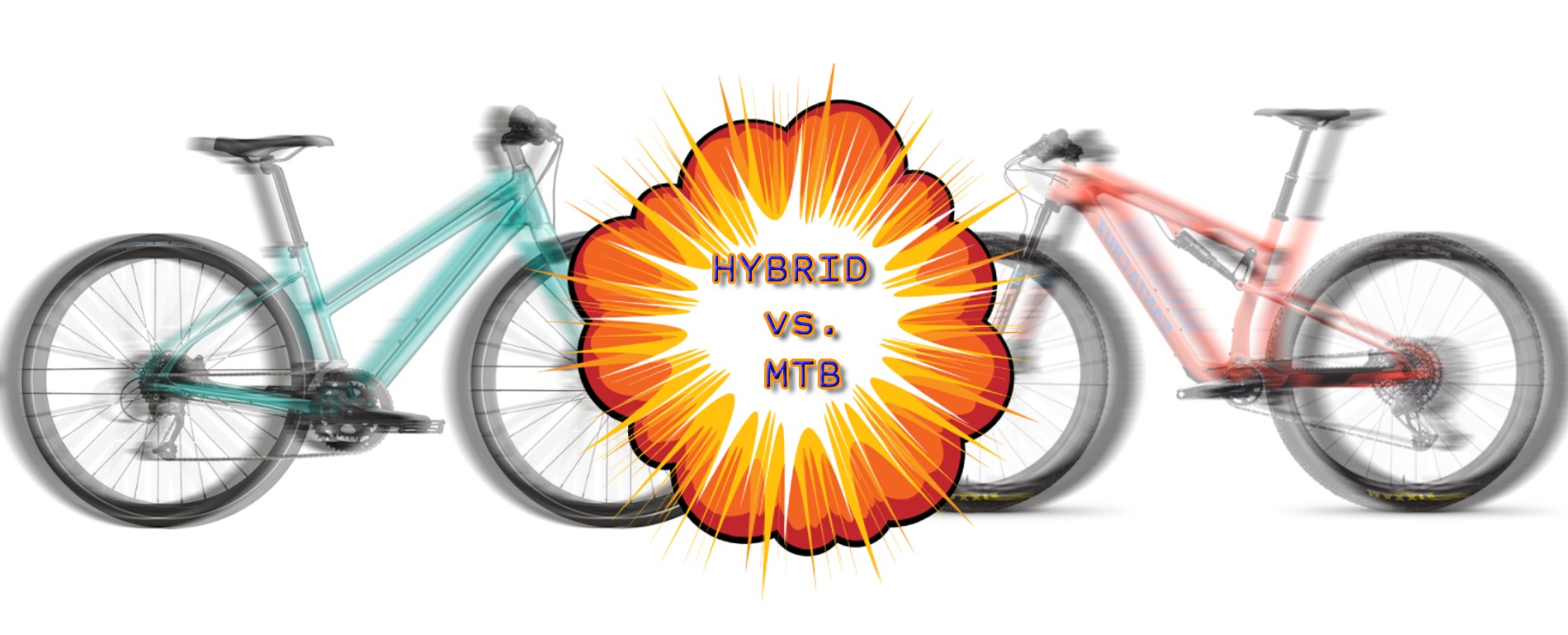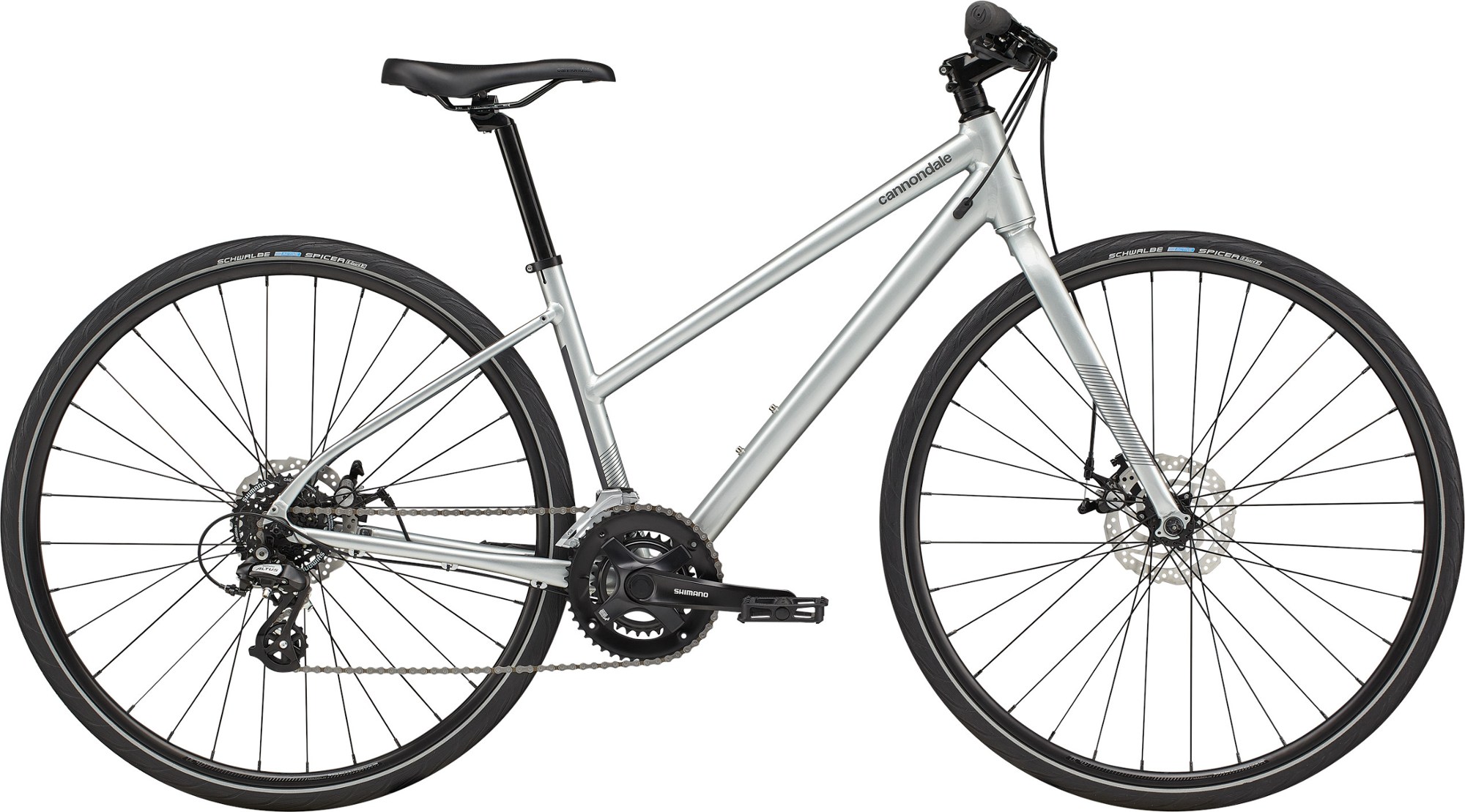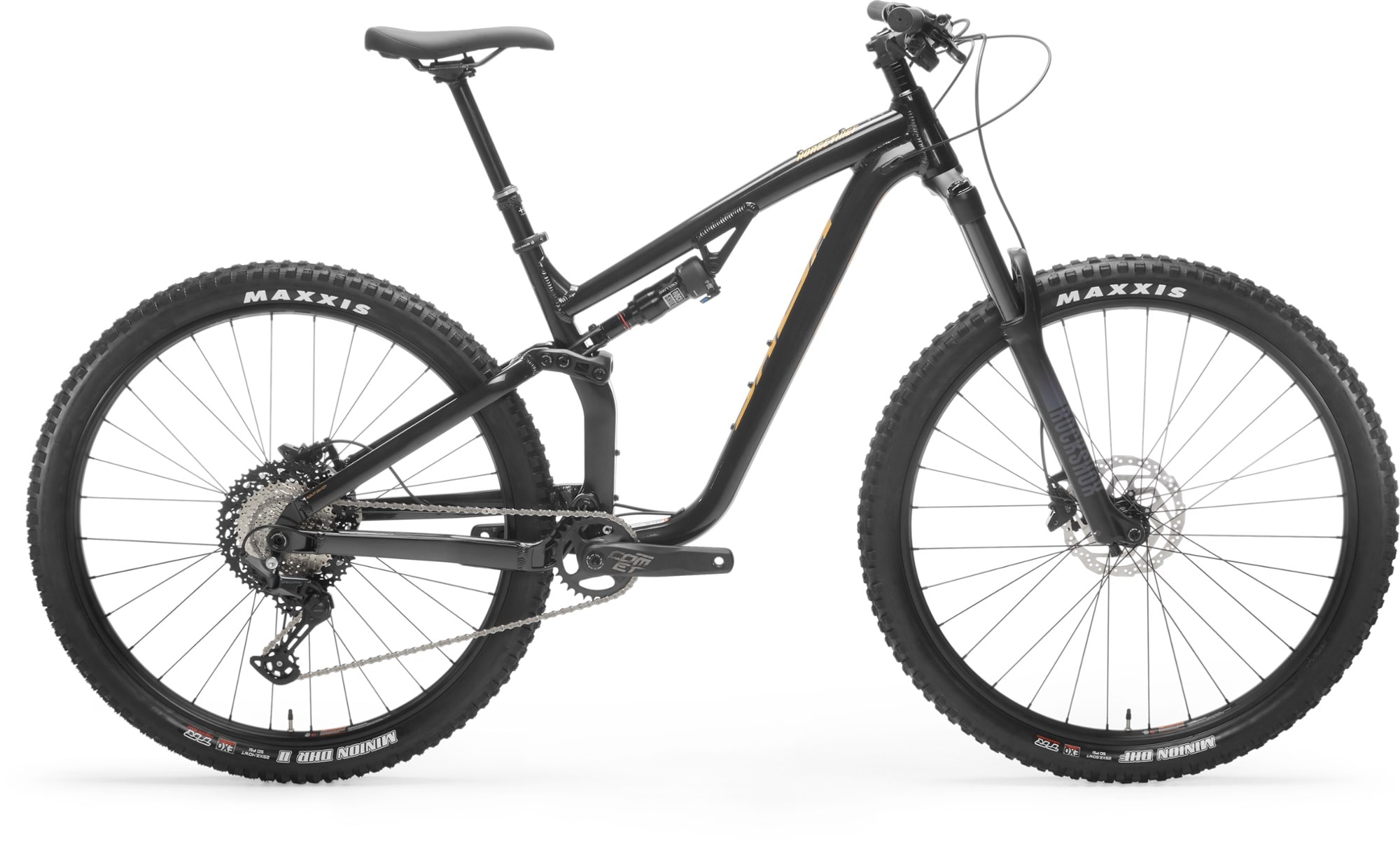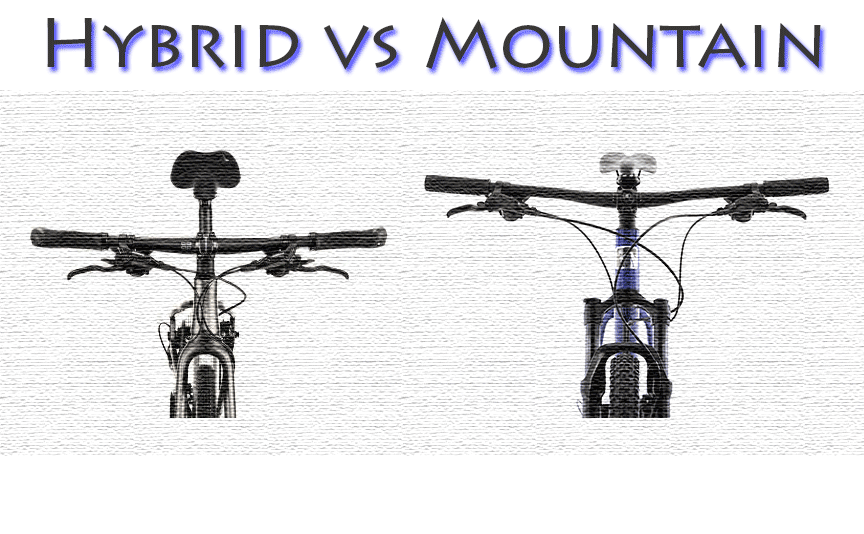Hybrid vs. Mountain Bikes: Which Type Suits Your Needs Better?

The Hybrid vs. Mountain bike question confuses a lot of cyclists who are trying to make an informed decision.
At first glance, some hybrid and mountain bikes look very similar. However, at closer inspection, we can see that they have some major differences that help them flourish in different settings.
If you’re wondering what the main differences between hybrid and mountain bikes are and which type is best for you, this article will answer any questions you may have.
One type is designed to tackle dirt, muddy trails, and technical terrain; whereas the other is an all-around workhorse.
Here’s how to choose!
Hybrid vs. Mountain Bikes — Main Differences
What is a Hybrid Bike?

Cannondale Quick is a great example of a classic hybrid mountain bike.
A hybrid bicycle is a combination of a road bike and a mountain bike. It uses the lightweight frame design and 700c wheel size of a road bike mixed with the straight handlebars and thicker tires of a mountain bike. In this way, you get a bike that’s easy to ride and tough enough for rough streets but not as heavy and cumbersome as a mountain bike.
Hybrid bikes aren’t as fast as road bikes and can’t handle the rough off-road conditions that a mountain bike can. However, they’re perfect for riding city streets, commuting to work, and collecting groceries, as they often feature cargo racks.
Sounds like exactly what you need? Learn more about how to choose the right hybrid bike or check out the best hybrid bikes we recommend.
What is a Mountain Bike?

Mountain bikes, like the Salsa Horsethief, typically have suspension and are designed for off-road riding.
A mountain bike is a bicycle specifically designed for riding on all types of off-road terrain, including gravel, dirt, sand, and rocks. They are characterized by big, thick tires and straight handlebars and usually have a suspension fork and sometimes rear suspension as well.
The thick tread on mountain bike tires means they don’t roll well on gravel and the heavy frames make them tiresome to ride. This means that although they’re tough, they aren’t ideal for riding on pavement or tarmac.
In terms of components, they have drivetrains with a low gear ratio, powerful brakes for steep descents, as well as front suspension and/or rear suspension.
If it seems like a mountain bike fits your needs better, check out more Mountain Bike FAQs or see what the best mountain bikes we recommend are.
Hybrid vs. Mountain Bike: Main Features to Consider

When choosing between a hybrid bike and a mountain bike, you’ll have to consider the type of riding you’ll be doing. Each bike has pros and cons when it comes to speed, comfort, versatility, and price.
- Speed: Hybrid bikes are usually faster than mountain bikes on pavement and tarmac. Naturally, a mountain bike will be faster off-road.
- Comfort: Hybrid bikes are more comfortable on roads but could get a bit bumpy off-road. Mountain bikes are cumbersome on-road but very comfortable on dirt, gravel and rocks.
- Versatility: Mountain bikes are more versatile as you can ride them anywhere, on any surface, and in any weather.
- Prices: Hybrid bikes generally have a lot of good cheap options, whereas cheap mountain bikes with full suspension could be harder to find at low price points.
Hybrid vs. Mountain Bike Main Differences
Here are the main areas in which hybrid and mountain bikes differ the most:
- Tires: Mountain bike tire width is thicker than hybrids, usually starting around 2″ and upwards, which provides more traction for off-road use. Hybrid tires are measured like road bikes, typically 35 – 42mm (1.3 – 1.6″).
- Wheels: MTB wheels are available in 26″, 27.5″, and 29″ wheel sizes, whereas hybrid bikes typically come with 700c rims only.
- Frames: Mountain bikes usually have very strong, thick aluminum or carbon frames designed to be light, durable, and responsive. Hybrid bikes typically have lightweight, aluminum frames that are ideal for riding around town, but some models also use carbon fiber frames or forks.
- Gears: Mountain bikes typically have a wide range of gears so that you get lots of options for steep uphills and descents. Hybrid bikes aren’t designed for hilly terrain, so they usually have fewer gears with a single or double front ring.
- Brakes: Mountain bikes almost exclusively use hydraulic disc brakes for excellent stopping power at high speed in any weather conditions. Most good-quality hybrid bikes also use disc brakes, but some entry-level models come with basic rim brakes which are sufficient for light riding.
In addition to these differences, suspension systems also vary significantly between these two types of bikes.
Mountain bikes often come equipped with advanced suspension systems. Hardtail mountain bikes have suspension forks, while full-suspension bikes have front and rear suspension. This allows them to absorb the impact from rough terrain and provide a smoother ride on trails.
Hybrid bikes, in contrast, may feature minimal to no suspension, as their primary use is on smoother surfaces where extensive shock absorption is unnecessary. This makes them lighter and more efficient on paved roads.
Furthermore, the seating position differs markedly; mountain bikes have a frame geometry that favors control and agility for off-road conditions, while hybrids offer a more upright, comfortable posture suited for longer rides on streets and paths.
This distinction in design philosophy underscores the specialized nature of mountain bikes for rugged terrain and the adaptability of hybrid bikes for varied urban environments.
Frequently Asked Questions
Why is a hybrid bike better than a mountain bike?
If you’re mainly traveling on town or city roads with occasional gravel or dirt track, then a hybrid bike will be more comfortable and efficient. While mountain bikes are more versatile in the terrain they can handle, they are only enjoyable if you intend to ride off-road for the majority of your cycling time. Hybrid bicycles deliver the light and breezy feeling of a road bike, making short trips around town an enjoyable and effortless endeavor.
What are the main road bike vs. hybrid bike differences?
Road bikes and hybrid bikes have more similarities than hybrid bikes and mountain bikes, but there are still some important differences to consider.
Hybrid bikes provide a significant advantage over road bikes because they have thicker tires and are suitable for both on and off-road terrains.
Related: Road Bike vs Hybrid Bike Guide: Which One to Get?
They may lack the high speed of a road bike but are far more comfortable to ride because of their upright riding position. The wider tires also absorb road vibrations better, adding to the comfort of the ride.
Hybrid bikes often have an adjustable stem, which makes them suitable for different size riders and easier to share with friends, but road bikes use a more versatile drop bar.
Unlike road bikes, most new hybrid bikes come with a 1x front cog, which means fewer mechanical parts and less maintenance.
Can you use a hybrid bike for trail riding?
While it is possible to tackle dirt and gravel roads with a hybrid bike, you would struggle to do real trail riding. A rocky mountain trail would cause significant shock to the relatively weak frame and wheels of a hybrid bike, likely ending in damage or an accident. Mountain bikes are specifically designed with strong frames, thick tires, and suspension designed to take on the abuses of trail riding.
If you plan to ride technical trails and descents, a proper full-suspension mountain bike is a much better choice.
Final Thoughts
In conclusion, the choice between a hybrid and a mountain bike boils down to your riding preferences and environment.
Hybrid bikes, with their road bike efficiency and some off-road capability, are excellent for city commutes and light trail use. They offer comfort, speed, and practicality for everyday use.
On the other hand, mountain bikes are unparalleled for off-road adventures, tackling rough terrains with ease. They’re built for durability and performance in challenging environments.
Ultimately, your decision should align with where and how you plan to ride. Whether it’s the versatile hybrid for urban landscapes or the rugged mountain bike for adventurous trails, each has its unique strengths to suit different cycling needs.



